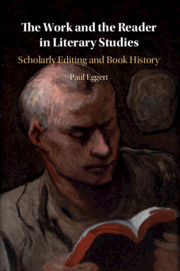Book contents
- The Work and the Reader in Literary Studies
- The Work and the Reader in Literary Studies
- Copyright page
- Dedication
- Contents
- Figures
- Preface
- Chapter 1 Introduction
- Chapter 2 Reviving the Work-Concept
- Chapter 3 The Digital Native Encounters the Printed Scholarly Edition Called Hamlet
- Chapter 4 The Reader-Oriented Scholarly Edition
- Chapter 5 Digital Editions
- Chapter 6 The Work, the Version and the Charles Harpur Critical Archive
- Chapter 7 Book History and Literary Study
- Chapter 8 Book History and Literary Study
- Chapter 9 Adaptation, Folklore and the Work
- Chapter 10 Conclusion
- Notes
- Bibliography
- Index
Chapter 5 - Digital Editions
The Archival Impulse and the Editorial Impulse
Published online by Cambridge University Press: 19 August 2019
- The Work and the Reader in Literary Studies
- The Work and the Reader in Literary Studies
- Copyright page
- Dedication
- Contents
- Figures
- Preface
- Chapter 1 Introduction
- Chapter 2 Reviving the Work-Concept
- Chapter 3 The Digital Native Encounters the Printed Scholarly Edition Called Hamlet
- Chapter 4 The Reader-Oriented Scholarly Edition
- Chapter 5 Digital Editions
- Chapter 6 The Work, the Version and the Charles Harpur Critical Archive
- Chapter 7 Book History and Literary Study
- Chapter 8 Book History and Literary Study
- Chapter 9 Adaptation, Folklore and the Work
- Chapter 10 Conclusion
- Notes
- Bibliography
- Index
Summary
‘Archive’ and ‘scholarly edition’ are not securely differentiated categories. As readers we inhabit the same textual field as the documents and texts we seek to define. To record is to read and analyse sufficiently for the archival purpose; to interpret, for the editorial purpose: i.e. to mount an argument about the archival materials directed at a readership. The archival impulse anticipates the editorial, and the editorial rests on the archival. They are not separate or objective categories. Their relationship may be figured as a horizontal slider running from archive on the left to edition on the right.
Every position on the slider involves interpretative judgement, but the archival impulse is more document-facing and the editorial is, relatively speaking, more audience-facing. Each depends upon or anticipates the need for its co-dependent Other. The archival impulse aims to satisfy the shared need for a reliable record of the documentary evidence; the editorial impulse to further interpret it for known or envisaged audiences by taking their anticipated needs into account.
The sliding scroll-bar model dispenses with recent anxiety about archives replacing editions.
Keywords
- Type
- Chapter
- Information
- The Work and the Reader in Literary StudiesScholarly Editing and Book History, pp. 80 - 92Publisher: Cambridge University PressPrint publication year: 2019
- 1
- Cited by

